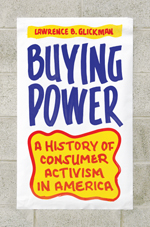The Whole Foods boycott and the history of consumer activism in America

In a posting for the Washington Post‘s Short Stack blog Lawrence B. Glickman, author of Buying Power: A History of Consumer Activism in America weighs in on the recent calls for a Whole Foods boycott in protest of an article written by company executive John Mackey critical of Obama’s health care reform program. With a large customer base of progressives ardently in support of reform, many feel betrayed by a company which they assumed would share their political and social agenda.
Glickman’s article points out the long history of consumer activism in the United States and the influential role it sometimes plays in American politics (think Boston Tea Party), yet as Glickman writes:
Despite their frequency throughout U.S. history, boycotts have rarely achieved their intended goals.… In the early 1900’s, African Americans in twenty-five Southern cities initiated boycotts of segregated streetcars. Most of these campaigns were short-lived, unsuccessful, and lost to history. Yet they marked an early step in the campaign against segregation, which culminated in large measure with another, successful effort—the most famous boycott in the history of the United States: the Montgomery Bus Boycott of 1955 and 1956. That movement not only ended Jim Crow transportation in that city but brought the Civil Rights campaign to the forefront of the nation’s political agenda and moral consciousness.
Without the early failures, we might never have seen the later and celebrated successes.
Read the complete article on the Washington Post‘s Short Stack blog.